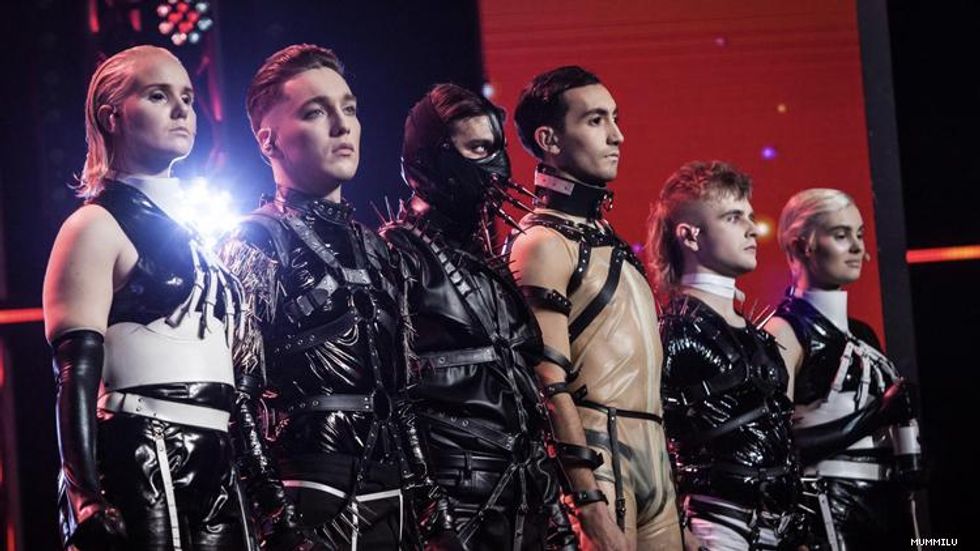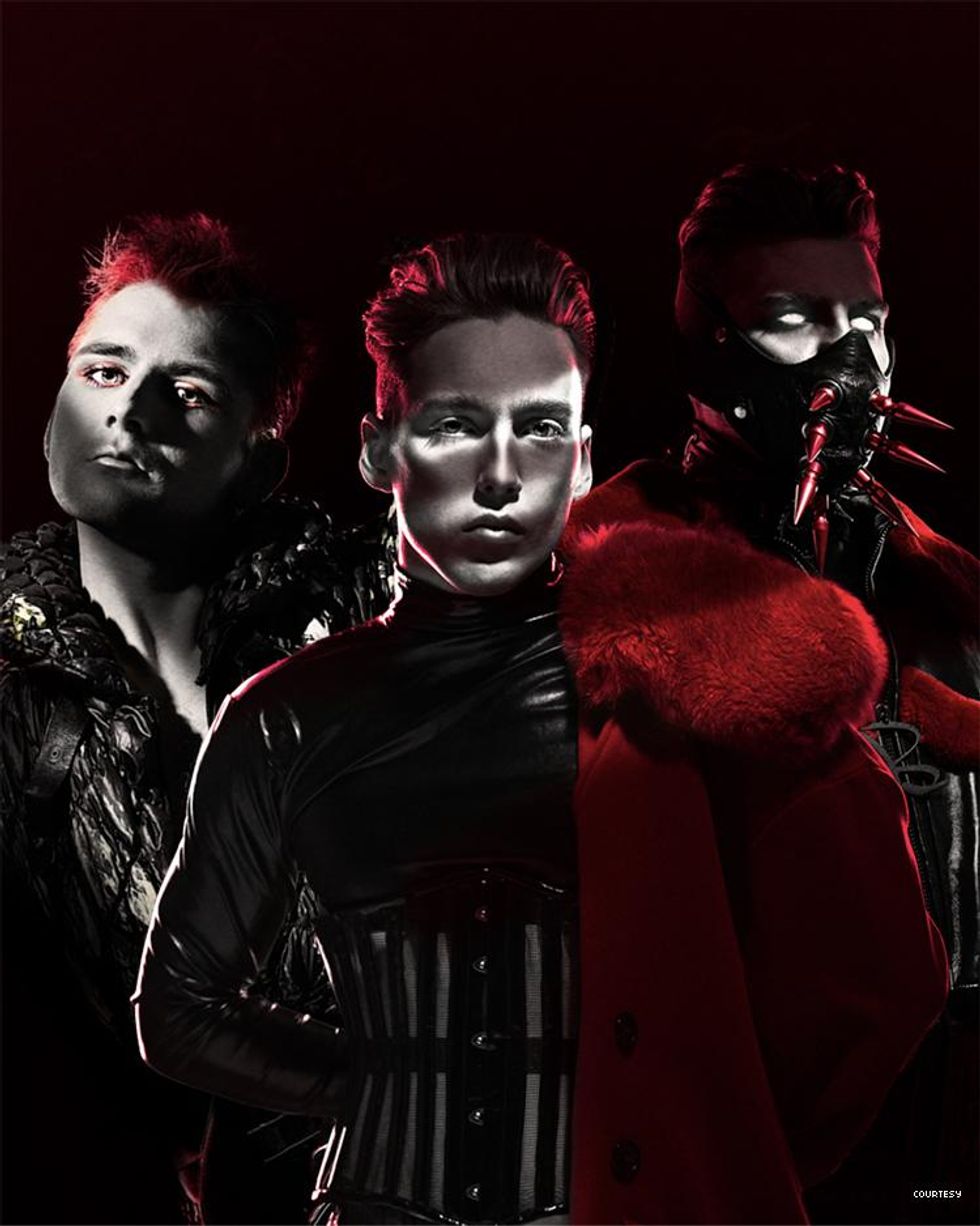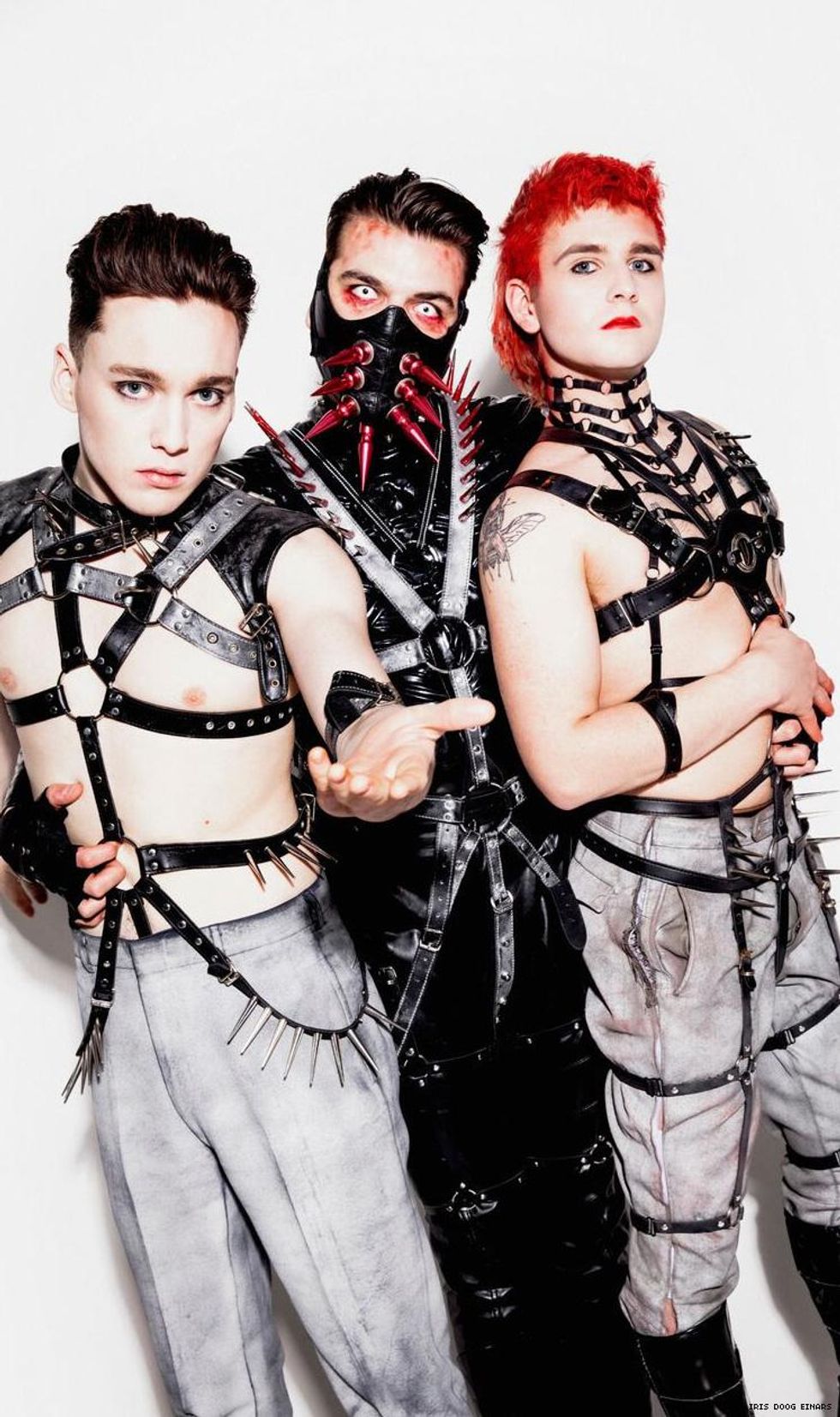Imagine if a singer on American Idol entered the audition wearing a leather harness or took the stage in a rubber gimp suit – and still made it to Hollywood. That’s roughly what it was like last year when the BDSM-inspired, techno-pop Icelandic band Hatari (translation: Haters) made it to the semi-finals on the Eurovision Song Contest.

Founded in 1956 Eurovision is the world’s longest-running televised song competition best known for the kind of songs that gave pop its reputation for being light and fun and not burdened by deep meaning. So it was shocking that the black leather-clad, overtly-political, highly-sexual Icelandic band landed in the competition on a song titled “Hate Will Prevail” about the downfall of Europe.
Perhaps the only thing more surprising was that the trio (Klemens Hannigan, Matthias Haraldsson, and Einar Stefansson) chose to attend the competition despite it being held in Israel. In 2011 Iceland became the first western European nation to officially recognize Palestine as an independent state. In the lead-up to the competition, Hatari made headlines condemning Israeli occupation of Palestine (and were threatened with expulsion). While over 20,000 people petitioned acts to boycott the song competition in Tel Aviv, Hatari chose to attend but spent time in the occupied territories, and later collaborated with both Palestinian musicians and the queer Palestinian fashion house tRASHY CLOTHING.

Although not LGBTQ+-identified themselves, the band considers themselves allies (one of their backup dancers is queer) and are willing to publicly counter the kind of toxic masculinity many heterosexual cisgender musicians have embraced.
In 2019, Haraldsson told the U.K. media outlet The Independent, “I’m masculine, Klemens is feminine; I’m repressed, Klemens is expressive; I’m hard, he’s soft; I scream, he sings; I’m stiff, he dances – we explore these contrasts.”
Hatari will be one of the bands performing at the Iceland music festival, Live From Reykjavík, streaming live this Friday and Saturday, November 13, and 14, 2020. The film A Song Called Hate documenting Hatari's experience in Tel Aviv is out next year, but you can watch the trailer below the following exclusive interview.
What inspired the band’s aesthetic?
When we first wrote our debut demo songs in the grassroots punk scene in Reykjavik, fascism and its dangers were on our minds. The look was based on military uniforms and Cold War stylings. Since then, anti-capitalist notions and dystopian aesthetics have developed with the band and the visuals have expanded. Alternative music has a long history of meta-authoritative commentary and black leather. Bondage is a great metaphor for the capitalist world order — we are bound by it like a tight leather leash. We will continue to experiment with our aesthetic and might look to a more sporty commercial motor-cross inspired look in the future.

None of the members identify as LGBTQ+ but you consider yourselves allies — in what way, and why is that important to you?
One of our dancers, Andrean, is a gay man and an LGBTQ+ activist. But the rest of us also recognize the importance of fighting ignorance and bigotry. Hate is on the rise in many forms and it’s up to all of us to stand up to it. There are so many victories yet to be won in the fight for LGBTQ+ rights across the world, especially in these times. Demagogues are on the rise and we need to stand guard around human rights. Their freedom is also our freedom, because tolerance and rights protect us all.
Can you tell me about your work with Rainbow Street? Why work with a Middle East/Africa organization?
Our collaborators, Bashar Murad and the designers of the prestigious fashion label tRASHY CLOTHING, have spoken actively for gay rights in their home country of Palestine. They pointed us in the direction of Rainbow Street and informed us about the important work they do. The result was a fundraiser and collaboration with tRASHY CLOTHING, where they designed a Hatari inspired collection. The profits benefitted Rainbow Street and they are still making payments from the sales to support their work. As they point out, fighting Pinkwashing can be challenging for queer Palestinians. With the tRASHY x HATARI collection we’re aiming to help queer people of the MENA region who are facing sexual orientation or gender expression based discrimination find a safe shelter and receive mental support through Rainbow Street.
Iceland is one of the least populated European nations—why does the country produce so many great musical artists?
We are a small, young nation on the fringe of the continent. As such, we are probably quite preoccupied with how we are perceived from the outside, and music and art is an important shaper of identity. Apart from that, working in such a small scene has its advantages. There are many resources at our disposal quite early in our careers. Lastly, success stories from other Icelanders are always a source of inspiration.
A Song Called Hate - Trailer from LevelK on Vimeo.















































































